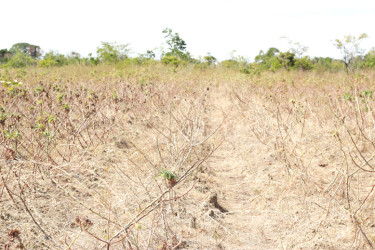Rain over the past few days has offered some relief to parts of the parched Rupununi but Regional Chairman Bryan Allicock says that impacts of the prolonged drought would continue to be felt in the next few months and some form of food aid would be necessary.
“We got to brace ourselves for it,” Allicock told Stabroek News during an interview at his office in Lethem yesterday. He explained that farmers would normally prepare small farms in October and November so that by December, as soon as the rains came, they would plant. These small farms would support farmers as they prepare their bigger farms in March and April for the long rainy season.

But with the prolonged drought, many farmers have been unable to plant their small farms, Allicock said. He said that even if the rains started now, they would not have produce as they would have to wait for their crops to grow. The chairman pointed out that when farmers plant in June, they cannot harvest until September and October.
Region Nine and other parts of the country have been in the grips of a drought as a result of the El Nino weather phenomenon since last year. Crops across the country have been hit and in Georgetown, the hours during which water is available through the pipes has been cut.
Stabroek News visited parts of Region Nine including Lethem earlier this week and for the first time in a while there were a few heavy downpours. While this was welcomed, residents pointed out that there is need for more but it is not clear if the rains would continue in the coming days.
“Even though we get these little showers, it’s just to water the plants, I don’t think it will make any impact,” Allicock told Stabroek News. “It’s a situation whereby we are really down, every day toshaos coming in to tell us about their plight in the villages,” he said.
The chairman related that cassava, a main staple of the indigenous peoples on the sprawling savannah region, are becoming “corky” – soft and dry. He said that he has warned the Ministry of Indigenous Peoples Affairs and the Ministry of Communities that food aid would be necessary.
“By the end of March into April, we’ll have to look at food aid and probably into August because even though the rains would come during that time, you wouldn’t have plants growing that fast to get tubers,” he explained.

“I know what is happening, I’ve visited the farms, sometimes you only see sticks, no leaves in these farms, all the leaves drop off so we know we’ll have a food shortage,” Allicock declared.
He said that they have been encouraging farmers to plant in flat lands where they would not normally plant. A number of farmers have done so. “We’re trying to encourage farmers, let they plant in the swamp so by the time June (arrives), they could harvest but we know we’ll have to get food aid,” he said.
The chairman related that thus far, about 13 pumps and 22 water tanks have been distributed throughout the region. Some of the pumps were lent to badly affected farmers, he disclosed. “All these pumps are on loan, at the end of the dry spell, we’ll bring them in back, service them and put them up for another time,” he said.
According to Allicock, they are trying to assist the most critically affected areas until they can get proper assistance to them. He said that the villages in the South Rupununi are the most critical including Karaudarnau and Shulinab.
He said that construction of a promised warehouse for the stockpiling of drought relief supplies in Lethem has not yet started and they are awaiting further supplies as all that has been sent to the Region so far, have been distributed.
“We already distributed all that we had,” Allicock said. “We have nothing on the ground, nothing, we are waiting, we already sent out everything that we had in store.” He emphasised that they have run out of pumps and only about two or three more black tanks remain. Supplies such as water purification tablets have been distributed and there is none in stock at the moment.
“It’s a situation whereby everything is looking for water, animals and so,” Allicock said, while noting that some cows had died. He also said that as a result of cows seeking water from farther away even at the Takutu River, rustlers are taking advantage of the situation and only recently one was caught after he had already killed a cow and was preparing to take it for sale at Marudi.
The chairman emphasised that the authorities are working to mitigate the situation. “We are putting all heads together in order to combat this situation…we know that we’ll be getting help from central government,” he said while pointing out that engagements are continuing with various ministries.
.





